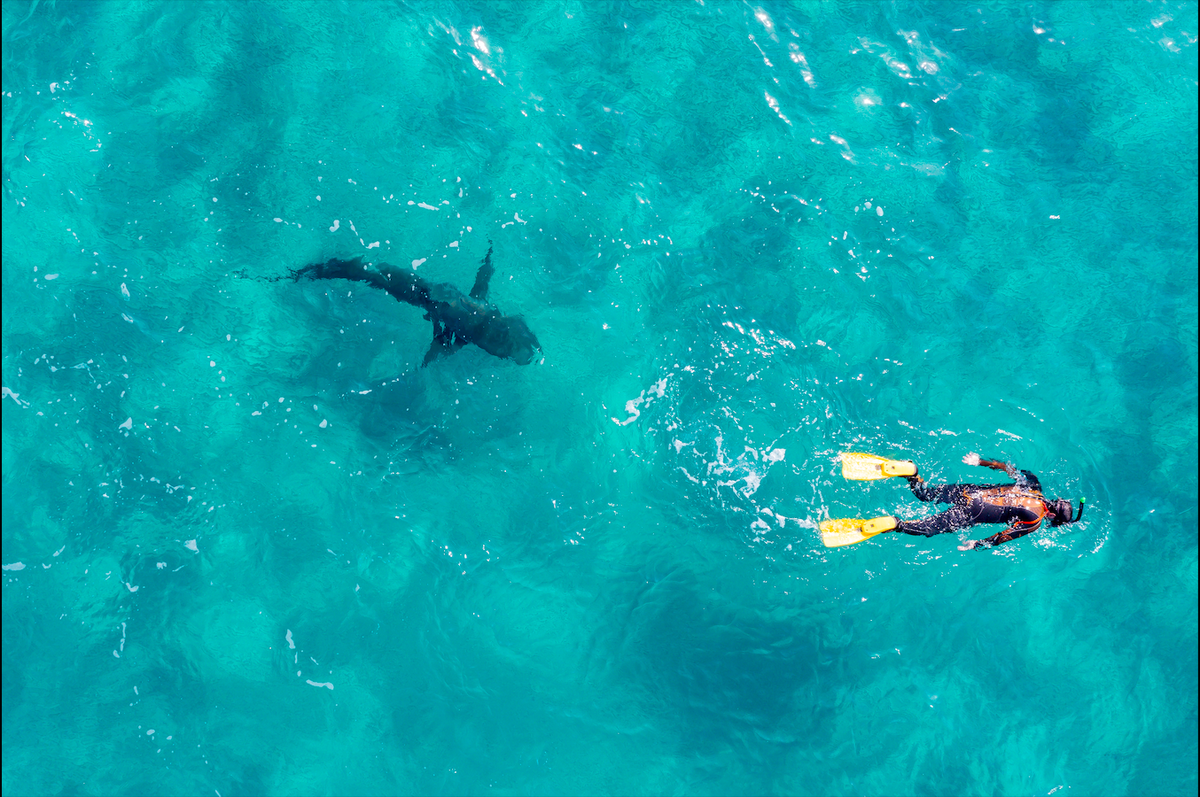Divers and tourists often underestimate the risks when approaching wild animals. photo credit: Luciano Santandreu/Shutterstock
A snorkeller has been fatally attacked off the coast of Hadera, Israel, in what experts describe as one of the rarest shark incidents ever recorded in the Mediterranean. Authorities believe the shark responsible was a dusky shark (Carcharhinus obscurus), a species long considered harmless to humans in the region. Although forensic confirmation is still pending, marine biologists say the evidence strongly points to this species.
The attack occurred near the warm-water outflow from the local power station, a site that has become popular among divers due to the regular presence of large sharks. These sharks are drawn to the area by the elevated water temperatures and increased fish activity. For years, locals and tourists have flocked there for close encounters, but officials have repeatedly warned that feeding or approaching the sharks could provoke aggressive responses.
A Mediterranean First
Why This Case Stands Out
If confirmed, the Hadera incident would mark the first recorded fatal attack involving a dusky shark in the Mediterranean Sea. While dusky sharks are found across warm and temperate oceans, they are rarely known to harm people. In most cases, encounters end without injury. This has led some scientists to call the April attack a statistical anomaly rather than an emerging trend.
Most Read on Euro Weekly News
Still, the event has reignited debate over changing marine behaviour in warming seas. Rising water temperatures and altered migration patterns are bringing species into contact with humans more often, and not only in the Mediterranean. Experts emphasise that even normally placid species can act unpredictably if they are stressed, competing for food, or used to being fed by humans.
Key Points
The fatal incident took place near Hadera, on Israel’s Mediterranean coast.
The suspected culprit, a dusky shark (Carcharhinus obscurus), is not normally aggressive towards humans.
Local conditions such as warm outflow water and fish concentration likely contributed to the unusual behaviour.
Authorities have advised against diving or feeding sharks in the area until further notice.
The incident underlines how easily a predictable attraction, warm water drawing marine life, can turn into danger when curiosity overrides caution. Divers and tourists often underestimate the risks when approaching wild animals in their natural environment. Even species long labelled as “inoffensive” can become aggressive when provoked or fed.
For swimmers, snorkelers and divers, the key is awareness. Simple actions like obeying closures, avoiding dusk or dawn swims, and not feeding wildlife drastically reduce an already minuscule risk. Statistically, shark attacks in the Mediterranean remain exceptionally rare, especially compared with other global coastlines.
Should Expats be worried?
The British community forms one of the largest expatriate groups in Europe, with hundreds of thousands of citizens living in Spain, France, Portugal, Cyprus and Greece. With such a large seaside population, the occasional headline about a shark sighting naturally raises concern, yet the data paints a reassuring picture.
According to global marine incident databases, there have been only a handful of recorded shark attacks in European waters over the past several decades, and very few involving expats living in Spain. Most cases in southern Europe involve tourists engaging in fishing, spear diving, or swimming in remote areas. For everyday beachgoers, the odds of encountering a dangerous shark remain close to zero.
That said, awareness is always wise. Many expats spend large portions of the year in the water, whether swimming, diving, or paddle boarding. Staying informed about local conditions, particularly near warm outflows, fish-cleaning zones, or areas where feeding is reported, is the simplest way to stay safe.
Safety for Swimmers and Divers
Practical Guidance
Always follow lifeguard and local authority warnings.
Avoid swimming during twilight hours when visibility is low.
Do not enter the water near fishing activity or if fish remains are visible.
If you see a shark, leave the water calmly and avoid sudden splashing.
Never feed or attempt to touch marine wildlife.
For expats in coastal areas of Spain, Italy or Greece, the lesson from Hadera is clear: respect the sea, enjoy it sensibly, and remember that the Mediterranean remains one of the safest major bodies of water in the world. While the has incident shocked many, it remains an extreme rarity rather than a sign of growing danger.

